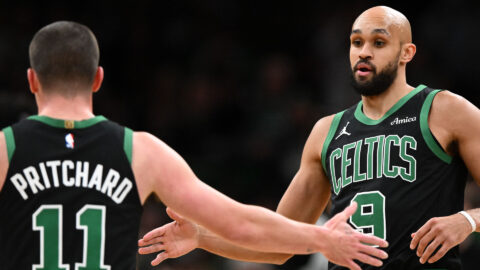NFL draft prospects can stumble upon a bottomless pit of money at the Senior Bowl, but it won't have much to do with their performance on the field. That January week in Mobile, Ala., turns into one of the first real opportunities for young players to peel back the curtain and stumble upon the traps of living the life of a professional athlete.
They'll find loan sharks crawling through the town, near the field, out at restaurants and in the hotels. They'll offer the players instant piles of money and huge lines of credit, at the cost of an interest rate that could approach 20 percent, something young adults simply can't understand if they haven't grown up in a structured financial environment.
In fact, one can't-miss, top-five prospect already has a $500,000 line of credit, according to a source. And when he shakes NFL commissioner Roger Goodell's hand next week in New York City, he'll still, technically, be jobless during the sport's uncertain climate in labor negotiations.
"The lenders are coming out of the woodwork," said Jon Peterson, a financial advisor who represents 65 NFL players. "They're aggressive, and they put together pools of money through investors. They're trying to be banks because a bank will turn down a 20-year-old college student who doesn't have a credit history, or a bad one."
It's not just the draft prospects, though. Loan sharks are trying to feed off everyone in the NFL during the work stoppage, and they're offering credit lines with interest rates that have been rumored to hit 30 percent — an astronomical figure that will doom anyone who is naive enough to accept it.
Financial issues are hardly new issues among professional athletes, but agents and advisors really took a hands-on approach to raise awareness in anticipation of the lockout. Spending too much on gifts is one thing, but an ill-informed investment can lead to immediate bankruptcy.
The agents and advisors have been sharing all of the horror stories they've seen and heard in the hopes that they can teach their clients to be more frugal, both now and throughout the rest of their lives. But they can only preach so much in the hope that their message gets across.
"I'm telling them not to spend anything," one agent said.
"We've known this was coming," another agent said. "If you didn't have an increased emphasis before now, it's too late isn't it? The guys that [have always done] a good job with their money will do a good job. The guys that don't won't. The lockout won't change any of that."
The stories of financial frailty are endless, and no one is exempt from a stupid decision that leaves them with nothing but lint in their pockets. They range from failed rap albums to misreading the real-estate market, according to numerous sources.
There was the No. 1 pick who had at tens of millions of dollars in the bank but decided he didn't want to live in one of his $1 million homes anymore, so he simply let it foreclose. Now, he's bankrupt.
There was another player who refused to hire a financial adviser because he said he had family members who were already in the business. Later, the source found out the player's sister was a bank teller who wasn't schooled how to manage a few hundred dollars, let alone hundreds of thousands.
There was the high-profile mercurial wide receiver who took out private loans to spend thousands of dollars to pay off the victims of two bar fights. Then he stopped repaying the loans.
There was another player who spent $3 million on a house in a falling market, despite incessant advice that he could wait six months to buy it for $2 million. Because of that, he couldn't afford to invest in Apple stock, which quickly quadrupled in value.
There was the player who let a girlfriend live in one of his houses on the other side of the country, and she told him she needed thousands of dollars to fix a hole in the roof. Sometime after sending her the money, he realized she was using him, and there was no hole at all.
So many players get swallowed up by investment schemes. They'll buy into a plan and fail to monitor the daily statements, and the rest of their business partners will sell their shares quickly enough to make some easy cash and move onto something else. All the while, the players are left with nothing, forcing many to file for bankruptcy.
"[Players] meet a guy who is really rich and say, 'Well, you're really rich, so you must know [about investments],'" Peterson said. "Yeah, he knows how to take your money, invest it, make a nickel off you and get out before you know what hits you. And these [players] had money. Yeah, they had $10 million [in the bank], but they had $20 million in debts. Then the partners got out, sold their shares and moved on, and they leave the players holding the bag at the end."
Players can get burned by their families all too often, too, and they can even be the root of their greatest financial problems. One league role model got taken by a handful of family members, including a grandmother who asked him for a large sum of cash and then sued him when he didn't loan her enough.
"When you see failure, it's a family unit that either doesn't understand [financial responsibility] or has their hands out," Peterson said. "Usually, you can read that when you're recruiting a family. You can read it pretty quick. You go to the family, and Mom puts her hand out and she has six rings on it, jewelry around her neck and everything else. You knew the minute her son had money she was going to exchange the fake for the real."
The problem with the families is always multilayered. First off, Peterson noted a lot of players come from families who haven't dealt with a lot of money, balanced checkbooks or managed savings and retirement accounts. So, when a player signs his first contract and puts a few hundred thousand dollars in the bank, it's unrealistic to expect them to know how to manage it without a financial adviser.
Then, of course it feels great to buy gifts for their closest supporters, but it can lead to greater problems years later. If they buy someone a Mercedes and it breaks down in a year, guess who pays the mechanic. And when the player is out of football — or, even worse, nearly broke — and that Mercedes dies, it's tough on the ego to put them in a Yugo.
There's another predicament with giving the parents an allowance, particularly if the parents stop working altogether. Because if the player didn't manage his money right throughout his career, the parents will need to find a job after their son retires. And it's hard for them to land a job after they go into an interview and say they've been living off their son for the last decade.
This issue can even spread out to other areas. A few years ago, a source mentioned a running back who entered the draft after suffering a significant injury in his last college season. When healthy, he was a solid second-round prospect, but there was almost no chance he'd get taken earlier than the fourth round because of the injury.
The running back's father was meeting with agents. One of the agents was realistic about his draft stock, and the other promised he could get the player into the first round — and thus, he could help him open a line of credit based on a first-round contract. The father wanted to use his son's salary to start a company that would be dedicated to flipping houses, so they went with the agent who had first-round promises and wound up disappointed when he was drafted in the fourth round, all because the father was more concerned with his real-estate venture than his son's best interests. Because of this, the player was in debt before his rookie season even started.
Peterson, who represents Patriots safeties Patrick Chung, James Sanders and Bret Lockett, has a strict strategy to keep his clients in good financial shape. Peterson and his clients will determine some necessary expenses each year — a house, car, travel and training fees, etc. — and set up a monthly budget that will go to work in a money market fund, with the rest going into savings and collecting more interest. Because of the lockout, he has set up a two-year plan for his clients to be on the safe side.
And while there are plenty of millionaires in the league, Peterson mentioned the players who are taken in the middle of the draft and won't make as much on their first contract. For instance, if they sign a three-year deal worth $1.2 million, Peterson estimated the most financially responsible players will only have $300,000-$400,000 saved at the end of their deal after taxes and expenses.
That's plenty of money, for sure, but it's not enough to last another 40-50 years. And with the average playing career lasting about 3.5 years, Peterson said players have to be extra careful with their money until they reach their second contract. One of the biggest challenges with that, according to one agent, is the financial competition among teammates, whether it's the minimum-salaried players joining a poker game against the high rollers, or the urge to buy a flashy car to stick out in the team parking lot.
"In your first contract, you don't make enough to never work again," Peterson said. "You've got to treat the kids like they're three years away from retirement, so they're 62. How does a 62-year-old run his money? He's going to be conservative. You try to do that until they get to their second contract. Then if you're like Sanders, and he's got a second contract, you start some long-term planning and say, 'OK, let's set you up for an income of $150,000 a year for the rest of your life.'"
This financial responsibility is even more crucial during the lockout. Players have access of up to $60,000 in an emergency fund if they weren't smart enough to prepare this situation, but after that, no one wants to be the poster child as the player who filed for bankruptcy during the work stoppage.
Yet, on the same merit, the thought might be very much overblown that the owners will hold even more leverage once a player is desperate to collect a check.
"If the owners think they're going to win by a war of attrition because the players are going to cave with their money, they're wrong," one agent said. "That's not going to happen. That's definitely not going to happen."
Right now, the most public conflict in this work stoppage features the players against the owners, but the battle in the shadows can be even scarier because so much of it has yet to be uncovered. The lockout has magnified the importance of financial frugality, and players have to be extremely disciplined when it comes to handling loan sharks, family members and hangers-on who believe loyalty is best shown through a diamond necklace, a real-estate scheme or an inflated interest rate.
"We talk about drugs [as a problem]," a league source said, "but money can be the most dangerous drug."



